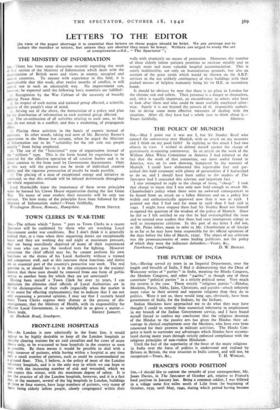THE POLICY OF MUNICH
Stu:,—May I point out it was not I, but Sir Stanley Reed who opened the controversy over Munich, with an attack on my manners and I think on my good faith? In replying to this attack I had two objects in view. I wished to defend myself against the charge of gratuitously re-opening controversy. In an article on the work of the William Allen White Committee in America I had referred to the fact that the work of that committee, our most useful friend in America, was, on its own showing, hampered by the memory of Munich. I could have elaborated this regrenable fact and gar- nished this bald statement with plenty of personalities if I had wished to do so, and I should have been unfair to the readers of The Spectator had I concealed this relevant and important fact.
I also attempted to reply to the charge of being " cheap." I took that charge to mean that I was only now bold enough to attack Mr. Chamberlain's policy when there were no awkward consequences to be feared from an attack on a fallen Minister and on a policy less widely and enthusiastically approved now than it was in t938. I pointed out that I had said far more in 1938 than I had said in 1940. I might have stopped there had Sir Stanley Reed not himself re-opened the question of the wisdom of the policy of Munich. Since he did so I felt entitled to say that he had oversimplified the issue and to remind your readers that there had been intemperate eulogy as well as intemperate criticism. In this part of my letter I did not, as Mr. Paine infers, mean to refer to Mr. Chamberlain at all (except in so far as he may have been responsible for the official optimism of the days before the Ides of March, 1939). The object of my criticism was the pronouncements of some leading publicists, not the policy of which they were the indiscreet defenders.—Yours, &c.,






























 Previous page
Previous page